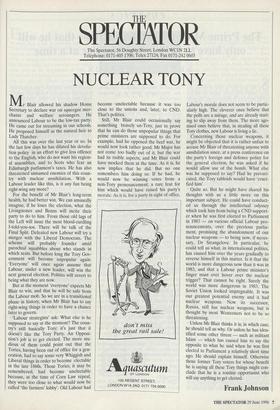SPEC I ATOR The Spectator, 56 Doughty Street, London WC1N 2LL Telephone:
0171-405 1706; Telex 27124; Fax 0171-242 0603
NUCLEAR TONY
Mr Blair allowed his shadow Home Secretary to declare war on squeegee mer- chants and welfare scroungers. He announced Labour to be the low-tax party. He came out for streaming in our schools. He proposed himself as the natural heir to Lady Thatcher. All this was over the last year or so. In the last few days he has diluted his devolu- tion policy in an effort to give less offence to the English, who do not want his region- al assemblies, and to Scots who fear an Edinburgh parliament's taxes. He has also threatened unnamed enemies of this coun- try with nuclear annihilation. With a Labour leader like this, is it any fun being right-wing any more?
For the benefit of Mr Blair's long-term health, he had better win. We can amusedly imagine, if he loses the election, what the Livingstones and Benns will incite their party to do to him. From those old lags of the Left will issue the most blood-curdling I-told-you-sos. There will be talk of the Final Split. Defeated new Labour will try a merger with the Liberal Democrats. The scheme will probably founder amid parochial squabbles about who stands in which seats. But before long the Tory Gov- ernment will become unpopular again. `Everyone' will once again assume that Labour, under a new leader, will win the next general election. Politics will revert to being what they are now.
But at the moment 'everyone' expects Mr Blair to win, and that he will be safe from the Labour mob. So we are in a transitional phase in history, when Mr Blair has to say right-wing things in order to have a chance later to govern. `Labour strategists' ask: What else is he supposed to say at the moment? The coun- try's still basically Tory; it's just that it doesn't like the Tory Party. An Opposi- tion's job is to get elected. The more stu- dious of them could point out that the Tories, having been out of office for a gen- eration, had to say some very Whiggish and Liberal things in order to become electable in the late 1860s. Those Tories, it may be remembered, had become unelectable because, at the time of Corn Law repeal, they were too close to what would now be called 'the farmers' lobby'. Old Labour had become unelectable because it was too close to the unions and, later, to CND. That's politics.
Still, Mr Blair could occasionally say something bravely un-Tory, just to prove that he can do those unpopular things that prime ministers are supposed to do. For example, had he opposed the beef war, he would now look rather good. Mr Major has not come too badly out of it, but the war had its risible aspects, and Mr Blair could have mocked them at the time. As it is, he now implies that he did. But no one remembers him doing so. If he had, he would now be winning votes from a non-Tory pronouncement; a rare feat for him which would have raised his party's morale. As it is, for a party in sight of office, Labour's morale does not seem to be partic- ularly high. The cleverer ones believe that the polls are a mirage, and are already start- ing to slip away from them. The more ago- nised ones believe that, in stealing all these Tory clothes, new Labour is living a lie.
Concerning those nuclear weapons, it might be objected that it is rather unfair to accuse Mr Blair of threatening anyone with annihilation since, at a press conference on the party's foreign and defence policy for the general election, he was asked if he would allow use of the bomb. What else was he supposed to say? Had he prevari- cated, the Tory tabloids would have 'cruci- fied him'.
Quite so. But he might have shared his thoughts with us a little more on this important subject. He could have conduct- ed us through the intellectual odyssey which took him from being a CND support- er when he was first elected to Parliament in 1983 — on various official Labour pro- nouncements, over the previous parlia- ment, promising the abandonment of our nuclear weapons — to being now, if neces- sary, Dr Strangelove. In particular, he could tell us what, in international politics, has caused him over the years gradually to reverse himself in this matter. Is it that the world is more dangerous now than it was in 1983, and that a Labour prime minister's finger must ever hover over the nuclear trigger? That cannot be right. Surely the world was more dangerous in 1983. The Soviet Union looked impregnable. It was our greatest potential enemy and it had nuclear weapons. Now its successor, Russia, still has nuclear weapons, but is thought by most Westerners not to be so threatening.
Unless Mr Blair thinks it is; in which case, he should tell us why. Or unless he has iden- tified some other threat — such as militant Islam — which has caused him to say the opposite to what he said when he was first elected to Parliament a relatively short time ago. He should explain himself. Otherwise those former Tory voters for whose benefit he is saying all these Tory things might con- clude that he is a routine opportunist who will say anything to get elected.
Frank Johnson


























































 Previous page
Previous page